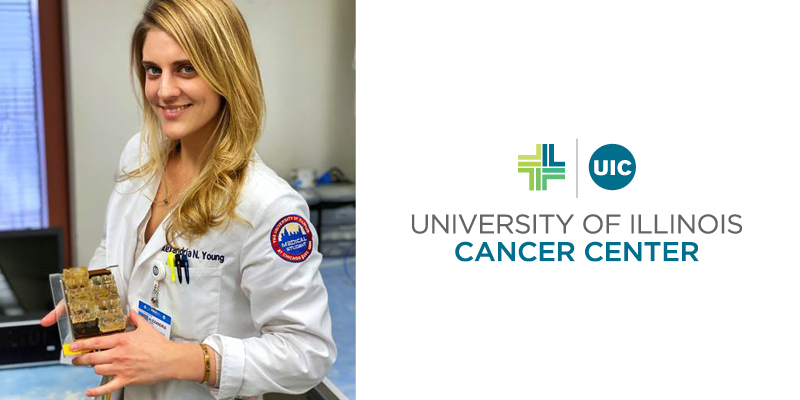
The small, handheld device Alexandria Young is helping create may look unusual and rudimentary to some, but she believes it has the ability to save the lives of women suffering from high grade serous ovarian cancer, the most lethal form of gynecologic cancer.
A MD/PhD student at the University of Illinois College of Medicine, Young is assisting researchers at the University of Illinois at Chicago, Northwestern University and Charles Stark Draper Laboratory in producing EVATAR, a miniaturized 3-D model of ovaries, fallopian tubes and other female reproductive organs. Similarly named for an avatar, a digital character video game users create to navigate a virtual world, the device is made with human tissue and will enable scientists to test new drugs for safety and effectiveness to better understand diseases such as cancer, endometriosis, fibroids and infertility.
“With the EVATAR system, we now have the capability to study the reproductive tract organs implicated in high grade serous ovarian cancer in the setting of a physiologically accurate menstrual cycle, which we hypothesize is essential in the development of the disease,” said Young, who was awarded a Ruth L. Kirschstein National Research service F30 award from the National Cancer Institute to fund her research.
“This project aims to leverage this innovative technology to target two central deficiencies in current HGSOC research: the lack of knowledge regarding the mechanisms of HGSOC initiation in the fallopian tube and the shortage of targeted chemotherapeutics for advanced stage disease.”
Ovarian cancer accounted for 7.2% of all female cancer deaths in Illinois from 2012-2017, according to the American Cancer Society.
Animal models are usually employed by scientists in the early phases of research, but they can fail to predict a therapy’s effectiveness or potential side effects in humans, especially with HGSOC, Young said. EVATAR is an organ-on-a-chip system, a small device that can control miniscule amounts of fluid moving through chambers of cultured tissues – in this case tissue acquired from women who were undergoing surgery – or cells that are continuously hydrated to mimic physiologic environments. The biomedical technology has many advantages over conventional 2-D or more advanced 3-D cell culture techniques, such as duplicating the functions of organs, vascular perfusion of nutrients and signaling molecules, and normal mechanical cues such as fluid shear stress.
“Until now, no models have existed that incorporate both reproductive tract tissues that are important in the development of HGSOC, the fallopian tube and ovary, in the setting of a physiologically accurate 28-day human menstrual cycle,” Young said.
A native of Northampton, Penn., Young was the first in her immediate family to earn a college degree, graduating with both a bachelor’s of the arts and of the sciences from the University of Pittsburgh. Witnessing how cancer has ravaged her family – two aunts and a grandfather died from the disease, and her mother is a survivor – she wants to find a way to help others overcome the malady.
“The female mentors in my life, both formal and familial, have formed the foundation of my decision to pursue a medical/doctorate degree,” said Young, who plans to become a gynecologic oncologist. “Even though my mother’s cancer is incurable and will eventually return, she remains strong for our family. Until it does, she has used it as a reason to improve her life and those around her.
“My mom has a renewed focus on life – eating healthy and exercising, spending time organizing charity events, traveling to new places and trying new things, living her life to the fullest. Her ability to take one of the darkest circumstances and transform it into something positive remains my greatest inspiration. She has always pushed me to be my best self, to never stop learning and helping others.”
During her doctorate training in medicinal chemistry and pharmacognosy, Young has worked under the watchful eye of Joanna Burdette, PhD, professor of pharmaceutical sciences and Associate Dean for Research and Graduate Programs in the UIC College of Pharmacy, and a member of the UI Cancer Center’s Cancer Biology program. Burdette’s laboratory focuses on biological questions that are important for women’s health by integrating imaging, drug discovery, microfluidics and basic biology to understand how and where ovarian cancers originate.
“EVATAR is groundbreaking science, making it possible to create a menstrual cycle in a dish, which we can use to study how ovulation influences ovarian cancer,” Burdette said. “Alexandria has played a large role in the development of this technology, and she has been a big asset in our lab. She has a work hard, play hard attitude that makes her a great person to be around both inside and outside of the lab. She is going to make a great physician-scientist.”
